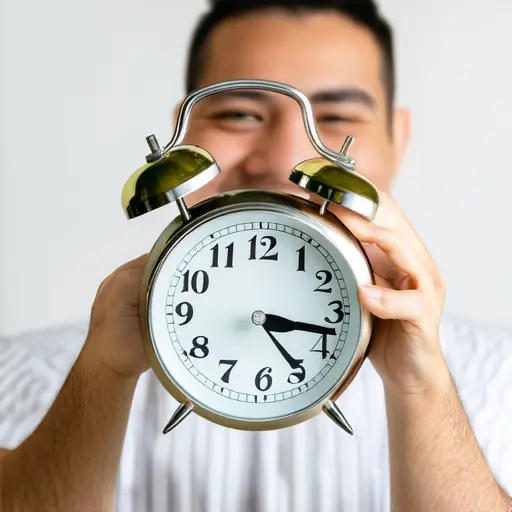A program so powerful, it’s designed to improve perfect eye health and give anyone who uses it crystal clear 20/20 vision in a matter of weeks.
The Surprising Link Between Sleep and How to Make Your Eyesight Better

Could Better Sleep Be the Secret to Sharper Vision?
What if the key to improving your eyesight was something you're already doing every night? While we often turn to carrots, eye exercises, or new glasses for better vision, quality sleep might be the unsung hero of eye health. Skimping on shut-eye does more than leave you yawning—it can lead to dry, irritated eyes, blurry vision, and even long-term damage. Let's uncover the fascinating connection between sleep and vision, bust some common myths, and share easy ways to wake up with brighter, healthier eyes.
Why Your Eyes Crave Quality Sleep
Think of your eyes as marathon runners—they're working overtime from the moment you wake up. Sleep is their much-needed recovery time, allowing them to repair tissue, replenish moisture, and clear out daily wear and tear. Without this downtime, your peepers become overworked employees—exhausted, strained, and more prone to problems.
The Eye-Opening Effects of Sleep Deprivation
Regularly missing sleep isn't just about dark circles—it's been tied to serious conditions like dry eye syndrome, glaucoma, and optic nerve damage. When you shortchange your sleep, your eyes miss their nightly maintenance window, leaving them vulnerable to inflammation and accelerated aging.
What You'll Discover in This Post
We'll explore everything from how REM sleep acts like a spa treatment for your eyes to simple bedtime tweaks that reduce strain. And don't worry—we'll keep it real about what sleep can (and can't) do for your vision.
How Sleep Naturally Boosts Your Eye Health
Sleep isn't just passive rest—it's an active repair session for your eyes. Here's the behind-the-scenes look at how different sleep stages work their magic.
REM Sleep: Your Eyes' Overnight Refresh
When you hit REM sleep (that dream-filled stage), your eyes get busy behind closed lids. This isn't just random movement—it's essential for:
The Natural Ultra Absorbable Dropper That Supports Strong Vision

Inside every drop of "EyeFortin" you'll find: A perfectly dosed proprietary blend of selected plants and minerals, carefully mixed to complement one another into a powerful vision supporting formula.
Learn more- Fueling up: Increased blood flow delivers oxygen and nutrients to tired eyes
- Staying lubricated: Tears replenish to prevent that gritty morning feeling
- Taking out the trash: Toxins from daily strain get flushed away
Deep Sleep: The Ultimate Stress Reliever
During deep sleep, your body dials down inflammation—the culprit behind puffy, red eyes. It also gives those tiny focusing muscles a much-needed break, helping them recover from hours of screen time or reading.
Melatonin: Your Eye's Nighttime Bodyguard
This sleep hormone moonlights as an antioxidant, protecting your retina from damage. Night owls and shift workers take note—low melatonin levels are linked to higher risks of age-related vision problems.
Sleep Problems That Could Be Hurting Your Vision
Not all sleep is created equal. Some common issues can undermine your eye health—even if you're technically clocking enough hours.
When Counting Sheep Leads to Dry Eyes
Tossing and turning doesn't just leave you tired—it can literally dry out your eyes. Research shows insomnia sufferers are three times more likely to develop dry eye disease. Ouch!
Sleep Apnea's Sneaky Effect on Vision
Those nighttime breathing pauses don't just disrupt sleep—they starve your optic nerve of oxygen, increasing glaucoma risk. If you snore loudly or wake up gasping, it's worth getting checked.
The Blue Light Dilemma
Scrolling before bed? You're double-whammied your eyes—suppressing melatonin while straining your focus. Try the 20-20-20 rule (every 20 minutes, look 20 feet away for 20 seconds) and enable night mode after dark.
Sleep Hacks for Healthier Eyes
A few simple changes to your nightly routine can make a world of difference for morning eye comfort.
How Many Hours Do Your Eyes Really Need?
7-9 hours is the sweet spot for most adults. Regularly dipping below 6 hours? You're rolling the dice on eye strain and faster vision changes.
Your Pillow Matters More Than You Think
Back sleeping is MVP for preventing morning puffiness. Side sleeper? A silk pillowcase reduces friction that can irritate eyes.
Why Pitch Black is Best
Even small amounts of light can disrupt your eyes' repair work. Blackout curtains or a good sleep mask help maximize melatonin production and retinal recovery.
Eat, Sleep, See Repeat: The Nutrition Connection
What's on your plate can support both better sleep and sharper vision.
Vision-Friendly Foods That Help You Sleep
- Salmon: Omega-3s fight dry eye while supporting melatonin
- Almonds: Their magnesium relaxes eye muscles and improves sleep
- Kiwi: This fuzzy fruit helps you fall asleep faster
Hydration Hacks for Clear Eyes
Dehydration leads to thicker, less effective tears. Stay hydrated during the day, but ease up 2 hours before bed to avoid midnight bathroom runs.
Do THIS 7-Second Trick Tonight, Restore Perfect 20/20 Vision Tomorrow

VisiSoothe - Vision Breakthrough
Learn moreDaytime Habits That Supercharge Your Sleep Benefits
Combine these with good sleep for maximum eye gains.
Quick Eye Exercises to Try
Before bed: Warm your palms and gently cup your closed eyes (palming). In the morning: Roll your eyes in circles to boost circulation.
Myth Buster: Can Sleep Fix All Vision Problems?
Let's get real about what sleep can—and can't—do for your eyesight.
"Extra Sleep Means 20/20 Vision"—True or False?
False. While sleep supports eye health beautifully, it won't correct refractive errors. You'll still need those glasses or contacts if your eye doctor prescribed them.
The Bottom Line
Getting quality sleep is one of the easiest ways to support your eye health naturally. From reducing daily strain to protecting against long-term damage, good sleep works hand-in-hand with other healthy habits. Tonight, why not start small? Dim those lights, put away the phone, and give your hardworking eyes the recovery time they've earned.










